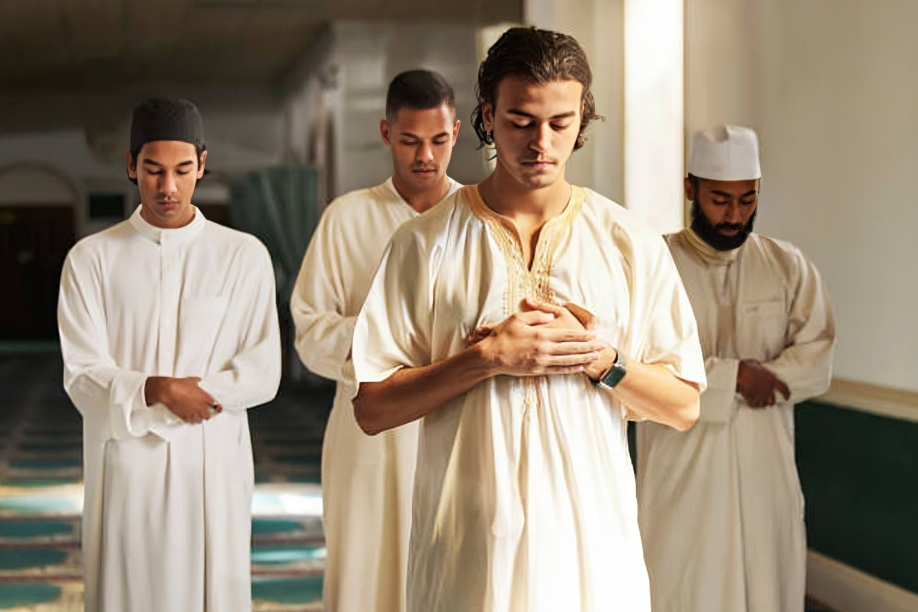Congregational Du‘aa’ After Burial
Sunnah Practice or Innovation?
Making du‘aa’ for the deceased after burial is Sunnah, as established by the Prophet ﷺ. However, turning it into a structured, habitual congregational practice with one person leading and others responding in unison is not Sunnah. Occasional group du‘aa’ may be acceptable if unplanned, but regularizing it is considered bidʿah.
| Congregational Du‘aa’ After Burial — Critical Overview | |
|---|---|
| Practice | Making structured, congregational du‘aa’ immediately after burial, led by an imam with the group responding “Ameen.” |
| Islamic ruling | Individual du‘aa’ after burial is Sunnah. Regularized congregational du‘aa’ is an innovation (bidʿah). Occasionally, unplanned group du‘aa’ is permissible. |
| When it started | Not from the Prophet ﷺ or the Companions. Formal group du‘aa’ after burial developed later as a cultural addition. |
| Where it spread | Common in South Asia, parts of the Middle East, and North Africa, where burial customs became ritualized. |
| Practices associated with it |
|
| Similarities in other religions (Muslims likely copied from) |
Shows how structured rituals after burial often develop culturally, not scripturally. |
Prophetic Guidance
The Prophet ﷺ said at a burial:
“Pray for forgiveness for your brother, and ask that he be made steadfast, for he is being questioned now.” Sunan Abu Dawood 3221
This shows that individual du‘aa’ after burial is Sunnah.
Scholarly Consensus
– Individual du‘aa’ after burial is Sunnah.
– Occasional group du‘aa’ is permissible if unplanned.
– Habitual, organized group du‘aa’ is an innovation.
– Paying imams specifically for du‘aa’ at graves is not prescribed.
The Wisdom Behind the Ruling
- Authenticity: Ensures practices remain faithful to the Prophet’s ﷺ way.
- Balance: Encourages sincere individual prayer rather than ritual formality.
- Clarity: Prevents cultural customs from being mistaken as Sunnah.
- Unity: Avoids disputes over practices not taught in Islam.
Common Misconceptions
1) “But making du‘aa’ together is powerful.”
Yes, but not every powerful act is Sunnah; structured du‘aa’ at every burial was never done by the Prophet ﷺ.
2) “If one person leads and others say Ameen, it’s fine.”
Occasionally, yes. But making it routine turns it into an innovation.
3) “Paying the imam for du‘aa’ guarantees acceptance.”
No. Sincerity is what matters, not payment. Supporting imams financially is good, but worship is not a commodity.
Contemporary Reflections
Burials are moments of raw grief. Islam directs us to keep them simple, with heartfelt du‘aa’ rather than formal rituals. Each believer’s sincere prayer for the deceased carries weight, without needing structured ceremonies.
Conclusion
Making du‘aa’ after burial is Sunnah, but organizing it as a structured group ritual is not. The best way to honor the deceased is through sincere individual prayers, sadaqah, and ongoing good deeds, not innovations added to the funeral rites.
References
Primary Sources
- Sunan Abu Dawood 3221: Du‘aa’ after burial.
- Sahih al-Bukhari 2697; Sahih Muslim 1718 : Innovation is rejected.
Secondary Sources
- Ibn Baaz, Fataawa, vol. 13 p. 204 – Occasional du‘aa’ acceptable, but not routine.
- Al-Albaani, Ahkaam al-Janaa’iz – Authenticity of du‘aa’ hadith and warnings against innovations in burials.
- Al-Shatibi, al-Iʿtisam – The principle of avoiding fixed innovations in worship.

